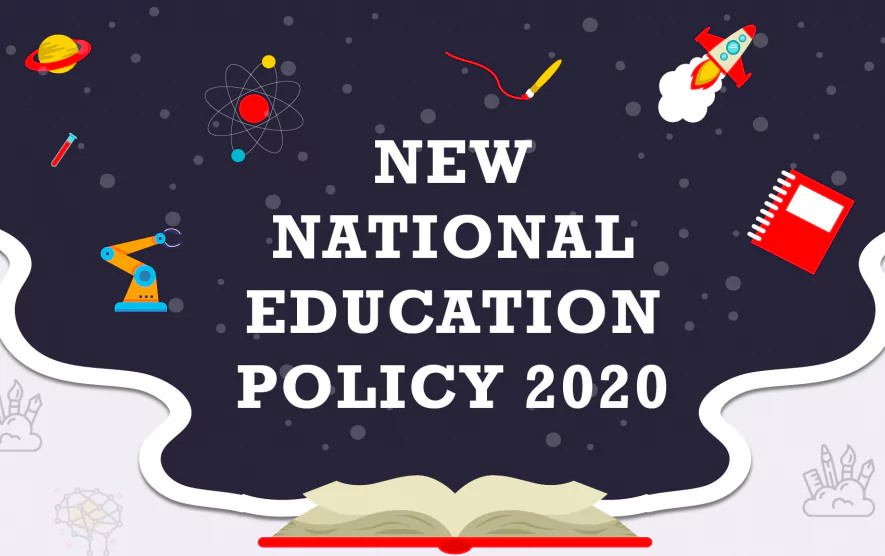India is changing how kids learn in school with a new plan called the National Education Policy (NEP) 2020. This big plan will help all kids in India learn better. A group of smart people, led by a scientist named Shri K Kasturirangan, made this plan. He used to be the boss of ISRO, which is like India’s NASA!
NEP 2020: Principles and Goals
The National Education Policy (NEP) 2020 is a new plan for schools in India. Its goal is to help people be happy and make the world a better place. The plan aims to teach children to be good, kind, curious, and creative. It wants children to grow up to be helpful and make the world a nicer place for everyone.
The NEP 2020 wants schools to be fair, accessible, good, and affordable. It also wants children to learn how to be good friends and understand their feelings. The plan has many ideas to help children learn these things. For example, it suggests teaching about feelings in school, letting children work together, making school a safe and happy place, helping children feel good, and teaching them to be kind and understanding.
Reforms and Changes Proposed by New Education Policy
To achieve these goals, the NEP 2020 proposes several reforms and changes in the structure, content, pedagogy, assessment, and governance of the education system. Some of the key features include:
- Early Childhood Care and Education (ECCE) for children from 3 to 6 years of age
- A restructured school curriculum into a 5+3+3+4 format
- Integration of vocational education into the school curriculum from class 6 onwards
- Multiple options and pathways for students to choose their subjects and courses according to their interests and abilities
- A three-language formula up to class 8
- Continuous and comprehensive evaluation of students’ learning outcomes through formative and summative assessments.

NEP 2020 Ambitious Plan
Overall, the NEP 2020 is an ambitious plan to transform India’s education system into one that provides universal access to quality education from pre-primary to higher education, covering both formal and non-formal modes of learning. It aims to:
- Integrate arts, humanities, and sciences in the curriculum for a holistic and interdisciplinary learning experience
- Foster creativity, innovation, and lifelong learning among learners through experiential and project-based learning
- Enhance the employability and entrepreneurial skills of learners through vocational education and skill development
- Promote multilingualism and respect for diversity in language and culture while ensuring proficiency in English and other languages of communication and knowledge
- Increase public investment in education to at least 6% of GDP.
Abbreviations used in NEP 2020
Abbreviations used in NEP 2020 refer to different types of courses or programs offered in the higher education system. Some of the common abbreviations and their meanings are:
| Abbreviation | Meaning | Description |
| OE | Open Elective | An elective course has chosen generally from an unrelated discipline/subject to seek multidisciplinary exposure |
| AEC | Ability Enhancement Course | A mandatory course on content related to language & literature (i) Compulsory – English communication (ii) Elective – Any other language other than English |
| VSC | Vocational Skill Course | A course aimed towards practical skills, hands-on training, and soft skills. Specific or supporting the major subject can be chosen from a basket of subjects offered by the college |
| SEC | Skill Enhancement Course | A course aimed towards practical skills, hands-on training, and soft skills. The subject can be chosen from a basket of subjects offered by the college |
| OJT/FP/CEP/RP | On-Job Training/ Field Project/ Community Engagement Program/ Research Project/ Internships | Application of knowledge/concepts in solving or analyzing real-life problems. All related to the major subject |
| CC | Co-Curricular Course | Holistic development of students through cultural activities like performing art, visual art, NSS, NCC, Yoga, etc |
| VEC | Value Education Course | Compulsory courses on (i) The constitution of India (ii) Environmental Education |

Examples of electives offered in NEP 2020
Examples of electives offered in NEP 2020 that suit the interests and goals of the students. Electives can be chosen from a wide range of subjects or domains, such as:
| Domain | Example of Elective |
| Skill India Mission | Courses that focus on developing skills for various sectors and industries, such as agriculture, manufacturing, services, etc. |
| Green Economy | Courses that promote environmental awareness and sustainability, such as renewable energy, waste management, organic farming, etc. |
| Entrepreneurial Mindset | Courses that foster creativity, innovation, and problem-solving skills, such as design thinking, social entrepreneurship, digital marketing, etc. |
| Elective Project | A project designed to acquire skills to supplement major study, such as research, internship, fieldwork, etc. |
Social and Emotional Learning
The NEP 2020 also emphasizes the importance of developing social and emotional skills among learners. It proposes various measures to foster these skills. Such as:
- incorporating social and emotional learning (SEL) in the curriculum and pedagogy,
- providing opportunities for peer learning and collaboration,
- creating a safe and supportive learning environment, promoting positive mental health and well-being, and
- developing a culture of empathy and respect.
The policy also acknowledges the role of UNESCO MGIEP in contributing to the development of social and emotional skills among learners. UNESCO MGIEP has created innovative digital platforms and tools for SEL, such as the Global Citizenship Curriculum (GCC), the Youth Resilience Survey (YRS), and the Transforming Education Conference for Humanity (TECH).
Conclusion
Overall, the NEP 2020 is a historic opportunity for India to create a world-class education system that can cater to the needs and aspirations of its diverse population. However, it is also a challenge that will require collective efforts from all stakeholders to overcome the existing gaps and barriers in the system. The success of the policy will depend on how well it is implemented and adapted to the changing contexts and demands of the 21st century.
Read More
NEP 2023: Everything You Need to Know About the New Policy
The New Education Policy 2020, Digitalization and Quality of Life in India: Some Reflections

